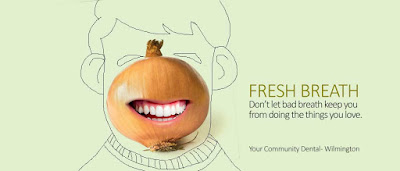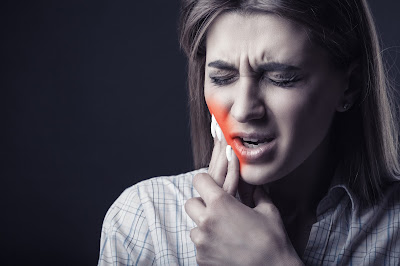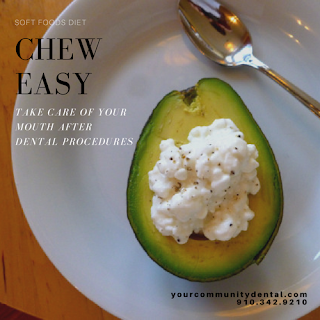Fresh Breath
FRESH
BREATH
Don’t let bad breath keep you
from doing the things you love. It’s time to act now and stop allowing chronic
bad breath to keep you from getting close to others. A quick consultation is
all it takes for you to be on the road to having fresh, clean breath.
We Can Help
At
Your Community Dental we
understand how important it is to have fresh, clean breath. That’s why we take
the time to consult with our patients in order to find the root cause of oral
malodor.
During the
consultation
1. We will look
at your medical history to see if there have been any ear, nose, or throat
problems.
2. We will also
look at any medication used, gastrointestinal issues, even allergies that could
be linked to the halitosis.
3. Then, we will
have a look at your diet history and social habits to help narrow down a cause.
You see, halitosis is not a diagnosis. It is a symptom of something else. Once
we are able to find the source, we can find a way to stop the bad breath from
happening.
4. Lastly, our
dentist will perform a complete oral examination. This is done to see if there
are any dead or decaying teeth causing or aiding in the creation of bad breath.
By the end of the consultation a plan to get rid of the halitosis
is created. This plan completely depends on your specific situation and could
vary anywhere from removing dead teeth, to performing a deep clean inside the
mouth. This first step is the most
important because unless you know the possible causes of your bad breath, there
is no way of attacking the source.
Periodontal Therapy
Often times gum disease or rotted teeth are the culprit
for causing bad breath. If this is
the case, the dentist may advise periodontal therapy. There are two types of
periodontal therapy: surgical and non-surgical.
SURGICAL
periodontal therapy includes, but is not limited to, any of the following
procedures:
·
Crown
Lengthening: Sometimes bits of food and plaque can collect in folds and cracks
in the gums, especially when the gums are overlapping particular teeth. Crown
lengthening is when the gums are re-contoured to provide more surface area for
the teeth in order to keep the gums clean and healthy.
·
Ridge
Augmentation: When teeth are pulled or fall out it can be difficult to keep the
area where the tooth was clean. Ridge augmentation is the process of filling
these indentations so that food and plaque are unable to collect and produce
halitosis.
·
Pocket
Reduction Surgery: This surgery illuminates, or at least greatly reduces, the space
between the tooth and the gums. By filling this space there is no room for
unwanted matter to collect. This process can also help perfect your smile.
NON-SURGICAL
periodontal therapy procedures:
·
Deep Cleaning: This is
usually the first procedure recommended. By performing a deep clean, the
dentist is able to notice particular problem areas in the mouth, as well as,
provide a smooth and clean mouth for the patient. It is advised to have this
done regularly, even if the halitosis goes away. Continually having a deep
clean will help fight against any future gum disease and other factors leading
to mouth odor.
·
Antibiotics: The dentist
may want to deliver local antibiotics below the gumline if there is evidence of
severe gum disease. This helps kill the disease so that the halitosis
discontinues.
·
Occlusal
Adjustment:
If your bite does not line-up correctly, there can be openings for food matter
to collect and rot, causing halitosis. By making this adjustment, through the
use of mouth pieces and alignment practices, bad breath can be eradicated (plus
your mouth and jaw become correctly aligned and healthy).
There are
more procedures available, but these are the ones most commonly used. But,
again, it all goes back to the consultation to find out the best plan of action
for your particular situation.
Different Types of Halitosis
Believe
it or not, there are different types of halitosis. And by finding out the kind
you have it can help track down the root cause of the bad breath. Here are the
most common types:
·
Fruity
Breath:
When your gums do not receive enough blood, disease begins to thrive. This
particular type of gum disease has a distinctively fruity smell. A tart, stale
odor is often found in diabetics whose bodies are unable to properly distribute
blood where it is needed.
·
Fecal Breath: There are
actual cases where the halitosis smells of feces. This deeply unfortunate type
of odor is a direct result of a severe bowel obstruction. Vomiting is also a
direct symptom of fecal breath, and anyone experiencing such issues should seek
medical help right away.
·
Ammonia
Breath:
This is when an individual suffers from chronic kidney failure and often has
ammonia scented breath. This, like fecal breath, is something that should
require immediate medical attention.
It
goes without saying that anyone experiencing halitosis will suffer negative consequences.
Bad breath can stifle your friendships, romantic relationships, even your
career.
Some Natural Remedies
Imagine
always feeling insecure, not about what you are saying, but in how it is
received because your breath smells. This is the case for millions of
Americans, but it does not have to be. As a matter of fact, if you are one who
suffers from halitosis of any kind, there are some simple homeopathic things
that could help get rid of, or at least lessen, the odor. These are good
procedures to use until you can make your consultation with us and we can find
the source of the halitosis.
·
Drink lots of
water:
Drinking and swishing cool water in the mouth can rid the mouth of unwanted
smells. This is especially useful in the mornings, right after you brush your
teeth.
·
Brush more: Many
individuals suffering from halitosis find that brushing after every meal helps
maintain fresh breath. Add in flossing once or twice a day and you should
notice some positive results.
·
Fresh
toothbrush:
The bristles to your toothbrush can hold smells when the brush is not replaced
properly. Changing your toothbrush every two to three months is ideal for
keeping things fresh.
·
Scrape your
tongue:
Each morning after you brush, take a tongue scrapper (or a spoon) and drag it
across the surface of the tongue. This will scrape off some of the unwanted
bacteria, fungus, and dead cells that produce bad odors.
·
Chew cloves: It sounds
strange, but chewing a handful of cloves can help kill halitosis. The
antiseptic qualities of cloves help fight halitosis.
·
Do the
obvious:
Chewing gum, eating mints, and staying away from smelly foods (foods with a lot
of garlic, onion, etc.) can all help reduce bad breath.
Unfortunately, for most people suffering with halitosis,
the natural remedies reduce the odor rather than illuminate it completely.
The
only true way to be cured of halitosis is to find the cause of the odor and
stop it there. And for this to happen, you need a good dentist. Luckily, we
have some of the best, most trained dentists available at Your Community Dental who are just
waiting to help you enjoy life again.
-Andrae
Bergeron










Comments
Post a Comment